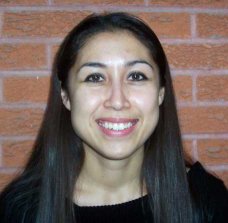Alumni Early Career Profiles - Monica Vasquez

| Name: | Monica Vasquez |
|---|---|
| Education: | B.S., Mathematics, The University of Arizona, May 2003 M.Ed., Education, The University of Arizona, May 2004 |
| Position: | Mathematics Teacher Pueblo Magnet High School Tucson Unified School District |
| Sector: | Education / Academia |
Description
A high school mathematics instructor teaches a range of courses from Algebra to AP Calculus. Responsibilities include teaching an average of 5 classes per day as well as preparing these students for standardized testing such as Arizona's Instrument to Measure Standards (AIMS) and other district-wide assessments. Non-teaching responsibilities are also required such as professional development and weekly departmental and school-wide meetings. This is currently my first year at this position and location.
Teaching mathematics requires many tasks. This includes aligning the Arizona State Standards to daily lesson plans as well as providing daily objectives to both student and administrator. A teacher also needs to create materials for the students to use. In general, a teacher instructs two different mathematical subject areas. A teacher has to be aware of each student's needs which may include English language learners or special education students and must make accommodations for each individual student's needs. A mathematics teacher must also be knowledgeable of the mathematics of Algebra, Geometry, Probability, Statistics, and Calculus.
I received a B.S. in Mathematics with an emphasis in Probability and Statistics and a minor in Molecular and Cellular Biology from The University of Arizona in May 2003. I continued my education at The University of Arizona and completed a Masters Degree in Education in May 2004. My degree in mathematics is extremely helpful in teaching high school mathematics. It is in my opinion that we need more educators teaching mathematics that are skilled and knowledgeable in this subject area. One more skill necessary to teach is that of compassion for our youth and the willingness to go to great lengths to help each student's academic, emotional, and physical development.
I strongly advise both the high school and college student to be interested in learning mathematics and to take as many mathematics courses as possible. Having knowledge of mathematics opens many doors and creates many different options for those students willing to pursue it. For example, as a mathematics undergraduate, I was able to study in a molecular biology laboratory. As a result of this research, I received a publication in The American Journal of Respiratory Critical Care Medicine entitled “Polymorphisms in the CD14 gene are associated with pulmonary function in farmers”. Although I have started my career, I still have the option and am currently seeking to apply for a Ph.D. in Biostatistics. Yet another option I might pursue is a Ph.D. in Ecology and Evolutionary Biology, where mathematics students create mathematical models for both Ecology and Evolutionary Biology concepts.